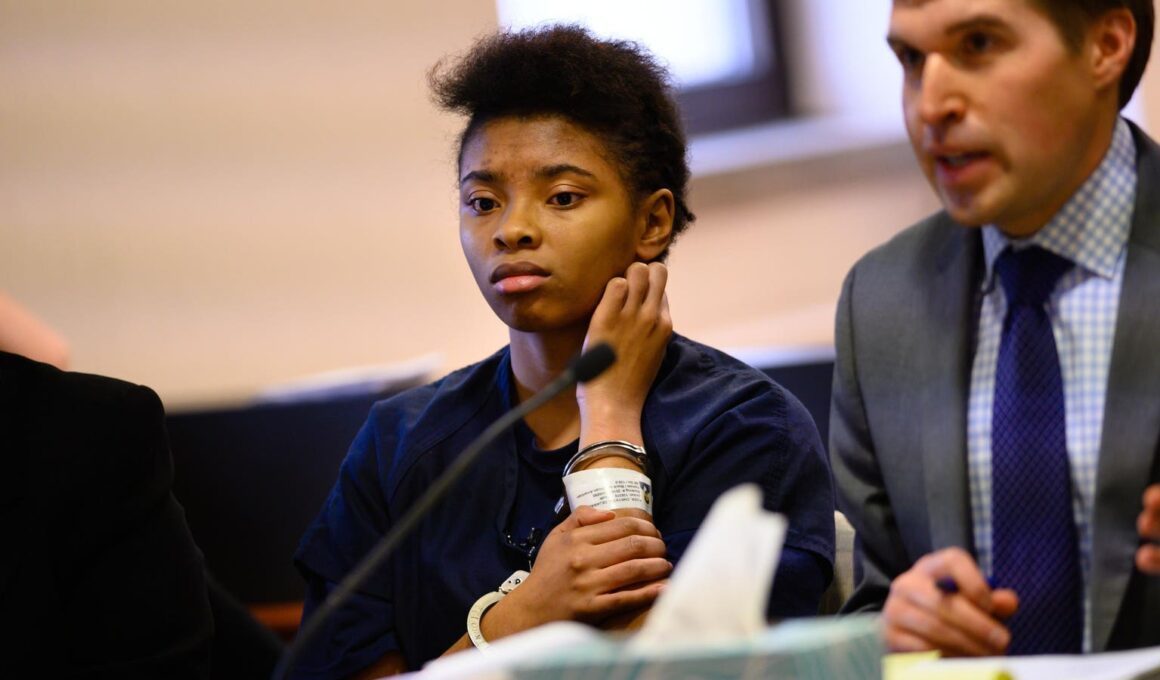Topline
Chrystul Kizer, a Wisconsin woman who fatally shot a man she said had been sex trafficking her, was sentenced to 11 years in prison on Monday, ending a six-year legal case that put a spotlight on sex trafficking victims.
Chrystul Kizer is pictured during a hearing in the Kenosha County Courthouse on Nov. 15, 2019.
Key Facts
Kizer was sentenced to 11 years of initial confinement followed by five years of parole, according to Wisconsin court documents.
She will likely serve less than 11 years total, though, as she was given credit for 570 days of time served, multiple outlets reported, meaning she will likely serve about nine-and-a-half years.
Kizer pleaded guilty to one count of reckless homicide, a reduced charge, in May for the death of Randall P. Volar in 2018, the Milwaukee Journal Sentinel reported.
She was 17 when Volar died and was initially charged with first-degree intentional homicide, but pleaded down to reckless homicide to avoid a trial and the potential for a life sentence.
Kizer’s lawyers had argued she had an affirmative defense—a defense in which a defendant can introduce evidence that could negate liability even if they committed the alleged acts—and was therefore immune from prosecution, arguing the man she killed had been sex trafficking her and her actions were committed because of his abuse.
Forbes has reached out to Kizer’s lawyers for comment on the sentencing.
Get Forbes Breaking News Text Alerts: We’re launching text message alerts so you’ll always know the biggest stories shaping the day’s headlines. Text “Alerts” to (201) 335-0739 or sign up here.
Key Background
Kizer reportedly met Volar—who was 34 when she was 17—about a year before he died after she posted an ad on backpage.com, a sex work website, however federal law makes it illegal for any minor to be bought or sold for sex. She said she first posted on the site “to get money for school supplies and snacks,” according to the Milwaukee Journal Sentinel, and she had to have another girl show her how to use it. Volar responded to her ad and reportedly took her on dates and gave her money and gifts and drugs in exchange for sex, the Washington Post reported, which would make him a buyer in the sex trafficking of a minor. Kizer alleged that for months, Volar paid her for sex and filmed the abuse. Kizer told detectives that when she killed him she “had gotten upset and she was tired of [him]
touching her,” so she shot him. After she shot him, Kizer burned the house down and left in his BMW, court documents showed. At the time of his death, her team argued he had been sexually abusing her and selling her as a prostitute, the Associated Press reported, which gave her an affirmative defense, though a judge pushed back on the use of the defense to protect from a homicide charge. But in 2022, the Wisconsin Supreme Court ruled Kizer could use the affirmative defense argument in her case.
Tangent
Months before Kizer, who is Black, killed Volar, who was white, police had found evidence he was having sex with a number of underage Black girls. He was arrested, charged and released without bail. The Milwaukee Journal Sentinel reported he had been under investigation for sexual conduct with girls as young as 12 when he met Kizer.
Big Number
30 years. That was the maximum sentence Kizer faced for pleading guilty to one count of second degree reckless homicide with use of a dangerous weapon, according to The Washington Post.
Further Reading
Israel and Hamas. Previously, she has covered a range of topics from Donald Trump’s legal battles to Taylor Swift’s path to becoming a billionaire. She joined Forbes in April 2022 and is based in Colorado. Prior to joining Forbes, Bohannon covered local news and spent time at the Fort Collins Coloradoan and the Arizona Republic. She graduated with a degree in journalism from Creighton University and has an MA in investigative journalism from Arizona State. Follow Bohannon for continued coverage of pop culture, politics and updates on the war in Gaza.
“>







